After school, Marisol eagerly starts for home to see if her cat, Luisa, has had her kittens. But before she can get there, Uncle Tomás calls to her. He needs Marisol to tell the poultry man that his chickens cost too much. Uncle Tomás cannot speak English so Marisol must do the talking–and she does. Marisol hurries on her way, but soon Auntie Flora stops her for help. Then Mrs. Lopez needs her, too. When Marisol finally gets home, her own mama needs her to hurry to the phone company to straighten out a bill. Luisa will have to wait.
immigrant
Super Cilantro Girl/La Superniña Del Cilantro
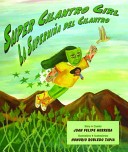
What happens when a small girl suddenly starts turning green, as green as a cilantro leaf, and grows to be fifty feet tall? She becomes Super Cilantro Girl, and can overcome all obstacles, that’s what! Esmeralda Sinfronteras is the winning super-hero in this effervescent tale about a child who flies huge distances and scales tall walls in order to rescue her mom. Award-winning writer Juan Felipe Herrera taps into the wellsprings of his imagination to address and transform the concerns many first-generation children have about national borders and immigrant status. Honorio Robledo Tapia has created brilliant images and landscapes that will delight all children.
First Person Fiction: Call Me Maria (First Person Fiction)

Maria is a girl caught between two worlds: Puerto Rico, where she was born, and New York, where she now lives in a basement apartment in the barrio. While her mother remains on the island, Maria lives with her father, the super of their building. As she struggles to lose her island accent, Maria does her best to find her place within the unfamiliar culture of the barrio. Finally, with the Spanglish of the barrio people ringing in her ears, she finds the poet within herself. In lush prose and spare, evocative poetry, Cofer weaves a powerful novel, bursting with life and hope.
Mama & Papa Have a Store
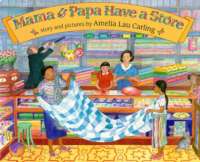
A young girl tells about a day in her family’s store and home in Guatemala City. Every day customers of many heritages—speaking Spanish, Chinese, and Mayan—come to buy cloth, buttons, and thread in colors like parrot green and mango yellow, and dozens of other items. While the girl’s parents and their friends talk about their hometown in China from where they emigrated many years ago, she and her siblings play games on the rooftop terrace, float paper boats, and make shadow puppets under the glow of flashlights. When the store closes, the girl dances to celebrate her day. Amelia Lau Carling’s thoroughly American children loved her childhood stories about Guatemala so much that she wrote them down for others.
Hello, America
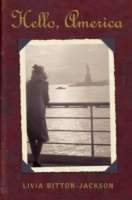
The year is 1951 and eighteen-year-old Elli and her mother arrive in New York City. Finally they can leave behind bitter Holocaust memories and become real Americans! From office filing all day, to the challenge of night school, to interpreting the intentions of Alex, a handsome and persistent doctor, Elli soon finds learning English is only half as hard as “making it” in this new world. Against a backdrop of soda shops, skyscrapers, and subways, acclaimed author Livia Bitton-Jackson fuses old-world tradition and modern dreams, in this vivid kaleidoscope of immigrant America.
Plantation Child and Other Stories

These vividly told tales of plantation life from decades past center around the lives of Marita Kim and her four younger brothers and sisters. The children experience many hardships growing up poor and motherless in a Korean camp in Hawaii, but their stories are full of adventure. In “Joe and the White Dog,” Joe takes Little Sister exploring and loses her… until a mysterious white-haired woman and her friendly dog appear to help. In “The Little People,” fearless six-year-old Puni searches for menehune to grant her wish for a new doll. The stories also provide a poignant look at the family’s daily struggles. In “Plantation Child” we see, through the eyes of Marita, the sacrifices made to pay for a pair of new shoes, the need for thrift and hard work to make ends meet. In “The Pineapple Cannery” we share in Marita’s excitement as she begins a new life working in Honolulu. The last story, “Abuji,” is a tender portrait of the long-widowed father, reminiscing about his youth and his return journey to Korea. Moving from child to child, from story to story, Eve Begley Kiehm brings to life a formative period in the history of Korean Americans in Hawaii.
The Arrival
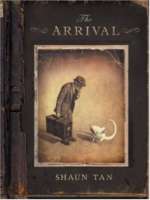
A man gives his wife and daughter a last kiss and boards a steamship to cross the ocean. He’s embarking on the most painful yet important journey of his life – he’s leaving home to build a better future for his family. Shaun Tan evokes universal aspects of an immigrant’s experience through a singular work of the imagination. He does so using brilliantly clear and mesmerizing images. Because the main character can’t communicate in words, the book forgoes them too. But while the reader experiences the main character’s isolation, he also shares his ultimate joy.
This book is a wordless picturebook.
Roots and Wings
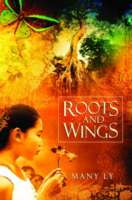
Grace’s grandmother has died, and she and her mother must travel back to the Cambodian community to give her a proper Cambodian funeral. Grace wants to use the trip to solve a few mysteries, like who her father was, why her mother and grandmother moved from St. Petersburg to Pennsylvania, where they’re the only Cambodians Grace has ever seen, and what Cambodian culture is really about. Embraced by her mother’s old friends, Grace feels both at home and lost, fascinated by the traditions she’s never known, but strangely judged by some members of the community.
Once upon a Full Moon
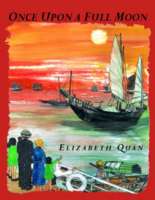
Elizabeth Quan’s father had made a success in the New World, but he longed for his home in China. So in the early 1920’s, he and his family set out on an arduous trip to the far side of the world. By train, ship, ferry, cart, and on foot, Elizabeth, her parents, and her brothers and sisters set off from Toronto to a village in China to visit the grandmother they have never met.From the mountain of luggage to the whales breaching in the Pacific and geishas on wooden sandals on the cobbled streets of Yokohama, Elizabeth Quan describes sights that would captivate any child. But hers is also a journey of personal discovery. Did she fit in in Canada, where her straight dark hair and even the foods she ate set her apart? Would she fit in in China where she was just as different to the people she met? In the course of her family’s travels she learns that home is a state of mind and that the moon can find us, no matter where we are.
A Song for Ba

In the Chinese opera, men traditionally sing both male and female parts. Wei Lim’s father, Ba, however, usually plays masculine characters and sings in a deep bass voice. But Wei’s grandfather played female roles, and has secretly taught Wei to sing these difficult parts. When the New World’s entertainments begin to cause a shrinking audience for the opera company, Ba is forced to play female characters.
